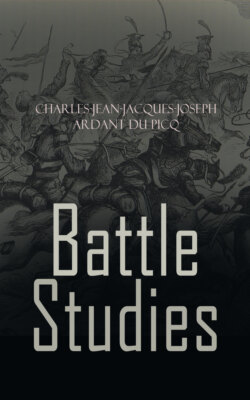Читать книгу Battle Studies - Charles-Jean-Jacques-Joseph Ardant du Picq - Страница 5
На сайте Литреса книга снята с продажи.
INTRODUCTION
ОглавлениеTable of Contents
We present to the public the complete works of Colonel Ardant du Picq, arranged according to the plan of the author, enlarged by unpublished fragments and documents.
These unpublished documents are partially known by those who have read "Studies on Combat" (Hachette & Dumaine, 1880). A second edition was called for after a considerable time. It has left ineffaceable traces in the minds of thinking men with experience. By its beauty and the vigor of its teachings, it has created in a faithful school of disciples a tradition of correct ideas.
For those familiar with the work, there is no need for emphasizing the importance and usefulness of this rejuvenated publication. In it they will find new sources of interest, which will confirm their admiration for the author.
They will also rejoice in the popularity of their teacher, already highly regarded in the eyes of his profession on account of his presentation of conclusions, the truth of which grows with years. His work merits widespread attention. It would be an error to leave it in the exclusive possession of special writers and military technicians. In language which is equal in power and pathetic beauty, it should carry its light much further and address itself to all readers who enjoy solid thought. Their ideas broadened, they will, without fail, join those already initiated.
No one can glance over these pages with indifference. No one can fail to be moved by the strong and substantial intellect they reveal. No one can fail to feel their profound depths. To facilitate treatment of a subject which presents certain difficulties, we shall confine ourselves to a succinct explanation of its essential elements, the general conception that unites them, and the purpose of the author. But we must not forget the dramatic mutilation of the work unfortunately never completed because of the glorious death of Ardant du Picq.
When Colonel Ardant du Picq was killed near Metz in 1870 by a Prussian shell, he left works that divide themselves into two well-defined categories:
(1) Completed works:
Pamphlet (printed in 1868 but not intended for sale), which forms
the first part of the present edition: Ancient Battle.
A series of memoirs and studies written in 1865. These are partly
reproduced in Appendices I and II herein.
(2) Notes jotted down on paper, sometimes developed into complete
chapters not requiring additions or revision, but sometimes
abridged and drawn up in haste. They reveal a brain completely
filled with its subject, perpetually working, noting a trait in a
rapid phrase, in a vibrating paragraph, in observations and
recollections that a future revision was to compile, unite and
complete.
The collection of these notes forms the second part: Modern Battle.
These notes were inspired by certain studies or memoirs which are
presented in Appendices I-V, and a Study on Combat, with which the
Colonel was occupied, and of which we gave a sketch at the end of
the pamphlet of 1868. He himself started research among the
officers of his acquaintance, superiors, equals or subordinates,
who had served in war. This occupied a great part of his life.
In order to collect from these officers, without change or misrepresentation, statements of their experiences while leading their men in battle or in their divers contacts with the enemy, he sent to each one a questionnaire, in the form of a circular. The reproduction herein is from the copy which was intended for General Lafont de Villiers, commanding the 21st Division at Limoges. It is impossible to over-emphasize the great value of this document which gives the key to the constant meditations of Ardant du Picq, the key to the reforms which his methodical and logical mind foresaw. It expounds a principle founded upon exact facts faithfully stated. His entire work, in embryo, can be seen between the lines of the questionnaire. This was his first attempt at reaction against the universal routine surrounding him.
From among the replies which he received and which his family carefully preserved, we have extracted the most conclusive. They will be found in Appendix II—Historical Documents. Brought to light, at the urgent request of the author, they complete the book, corroborating statements by examples. They illuminate his doctrines by authentic historical depositions.
In arranging this edition we are guided solely by the absolute respect which we have for the genius of Ardant du Picq. We have endeavored to reproduce his papers in their entirety, without removing or adding anything. Certain disconnected portions have an inspired and fiery touch which would be lessened by the superfluous finish of an attempt at editing. Some repetitions are to be found; they show that the appendices were the basis for the second part of the volume, Modern Battle. It may be stated that the work, suddenly halted in 1870, contains criticisms, on the staff for instance, which aim at radical reforms.
ERNEST JUDET.
